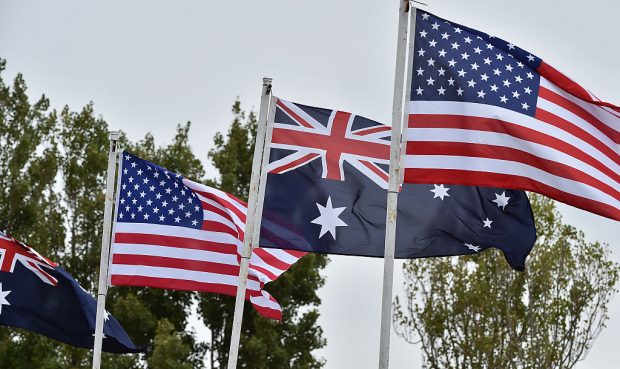 The U.S. alliance has long been an article of faith for Australian politicians. Since World War II, governments on both sides of politics have rightly recognised the importance of maintaining deep strategic ties with the United States of America.
The U.S. alliance has long been an article of faith for Australian politicians. Since World War II, governments on both sides of politics have rightly recognised the importance of maintaining deep strategic ties with the United States of America.
This has allowed the alliance to go from strength to strength through the tenure of 12 presidents and 14 prime ministers.
But the alliance is now being questioned by senior ALP figures.
Immediately following the election, Bob Carr argued that Australia should quietly disentangle itself from the U.S. command structure, and maintain a respectful distance for the duration of Trump’s presidency.
Paul Keating was more explicit, arguing that Trump’s election is a sign for Australia to re-orient itself towards Asia.
“It’s time to cut the tag. Time to get out of it,” he said, in an interview on ABC’s 7.30. “What we need to do is make our way in Asia ourselves with an independent foreign policy.”
Keating and Carr have now been joined by current ALP shadow ministers, including Penny Wong and Tanya Plibersek — albeit in the more measured way their senior positions require.
In a Sydney Morning Herald op-ed, Wong carefully called for a reassessment of Australia’s foreign policy, stating that the election of Trump was “a change point,” and that “a broader range of scenarios” would now need to be considered. Wong also criticised Turnbull’s business-as-usual response to Trump’s election, all the while paying lip-service to the importance of the alliance.
Plibersek echoed Wong’s sentiments, arguing for a “cautious approach” to our relationship with the US, in which should “decide on a case-by-case basis on what is in our national interest.”
This criticism of the US-alliance will be met with applause by much of the population — according to a Lowy Institute poll, it’s the view of 45 percent of Australians.
But it is a foolish approach that risks damaging a relationship that is far more important than mere strategic self-interest.
Our alliance with the U.S. is based on a shared culture and set of political institutions dating back before Magna Carta. As Anglosphere nations, our political institutions can be traced back to the common law society of pre-medieval England.
As Daniel Hannan writes in Inventing Freedom, the common law was unique in that it was a bottom-up system of law that evolved to mediate disputes.
This lead to a group of societies that view the state as subordinate to the individual, that have a presumption of freedom, and whose concept of nationality is based not on ethnicity, but on the adherence to a set of values.
Along with a shared language, this is the reason the Anglosphere countries are strikingly similar and distinct from other western European cultures, let alone the rest of the world.
Keating may think our future security lies in stronger ties with Asia — he’s been banging on about it for the last 20 years. It appears this attitude may be shared by senior ALP shadow minister. But we are never going to have as close a relationship with Asia as we do with Anglosphere allies like the United States.
Agreements like the so-called ‘Five Eyes’ intelligence sharing arrangement (involving the U.S., U.K., Australia, Canada, and New Zealand) are only possible because of the deep cultural and political connections between our Anglosphere countries.
Trump is not an existential risk
There is a reason for Australians to be concerned about Trump’s policies. His anti-trade rhetoric, including his proposals to pull out of the TPP, tear up NAFTA, and introduce a 45 percent tariff on Chinese goods are misguided, to say the least.
But the reality of US politics is that presidents very rarely live up to their campaign rhetoric. Take Obama, for example. In 2008 he ran on the lofty rhetoric of “hope” and “change”. He pledged to restore civil liberties, introduce whistleblower protections, reduce US intervention in the middle-east, and roll back executive power.
Anyone who thinks he has followed through on these promises needs their head checked. With a few exceptions he has done the exact opposite.
The same will happen with Trump because the US political system is designed to make it incredibly difficult to get things done.
The legislative and executive branches, Congress and the President, are designed as two competing centres of power. Gridlock is a feature of their political system, not a bug.
Admittedly, President Trump won’t be facing an overtly hostile congress — at least not for the first two years. Both houses are safely under Republican control, and many in the party will want to come together.
But the intense opposition to Trump — encapsulated in the #NeverTrump movement — arose for a reason, and it isn’t going to completely disappear overnight.
Many GOP politicians, and much of the political class, are intensely opposed to Trump’s brand of nativist populism. The grassroots energy might be with Trump, but that doesn’t mean the likes of Paul Ryan will suddenly abandon their long-held support for the pro-trade, small government agenda that has dominated the party since Ronald Reagan.
So if Trump wants to get anything done, he’ll have to moderate his more extreme views. The GOP will work to implement much of his agenda. But no GOP-controlled congress is going to support a trade-war with China.
Likewise, whilst there is room for Trump to modify U.S. foreign policy, the foreign policy and defence bureaucracy will resist any move to suddenly abandon America’s closest allies — particularly allies like Australia, which isn’t a “strategic bludger,” as Christopher Pyne put it.
If Trump fails to moderate his views there will be constant conflict within the GOP, and a resurgent Democratic Party that already despises Trump, and is increasingly moving to the Bernie Sanders left.
Trump is unpredictable and abrasive, but he’s not stupid. And Australia shouldn’t abandon the alliance on the assumption that he is.
As John Howard said on 7.30 last week, “The worst thing we could do, is to react in a way that anticipates something that isn’t necessarily going to happen.”
Wasting the Brexit opportunity
Re-orienting Australia’s foreign policy towards Asia also risks wasting the once in a generation opportunity to strengthen ties amongst the Anglosphere, which is made possible by the U.K’s coming independence from the European Union.
There is already growing support for a free trade agreement between Canada, Australia, New Zealand, and the United Kingdom. This so-called CANZUK agreement could provide an example of unfettered free trade, and possibly the freer movement of labour, without the controversy that often arises from such agreements between economically disparate, and culturally dissimilar nations.
Given Trump’s anti-trade rhetoric, it is unlikely the U.S. would want to be involved. At least not directly. But by strengthening the ties between four of the so-called “Five Eyes” countries, this agreement could act as a stabilising force for the alliance.
And despite Trump’s hostility to NATO, his desire to pull out of TPP and tear up NAFTA, there is reason to believe he recognises the importance of close relations with the core Anglosphere countries.
In his first conversation with U.K. Prime Minister Theresa May, Trump reportedly spoke of his desire to rekindle the kind of close relationship the two countries had under Reagan and Thatcher. And when speaking to Malcolm Turnbull, he reportedly agreed on the importance of a strong U.S. presence in the Asia pacific region.
This makes scaling back the alliance an absurdity.
Australia should continue our close relationship with the United States and work towards greater ties between the Anglosphere. Nothing good will be achieved by abandoning our closest ally.
Patrick Hannaford is an Australian writer, formerly based in Washington D.C. You can follow him @PatHannaford
Got something to add? Join the discussion and comment below.
Get 10 issues for just $10
Subscribe to The Spectator Australia today for the next 10 magazine issues, plus full online access, for just $10.

























Comments
Don't miss out
Join the conversation with other Spectator Australia readers. Subscribe to leave a comment.
SUBSCRIBEAlready a subscriber? Log in